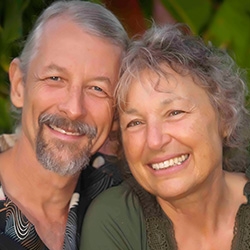
Search Results: identity
-
Some of my core beliefs make experiencing gratitude difficult . For example, it’s difficult to celebrate others or myself when I think I have to prove my worth in order to be accepted. So much energy goes into proving myself, there’s little left for celebration.
-
Listen to Jim and Jori Manske share how we are conditioned to disconnect from our own feelings and how we can unlearn this habit to experience more full and rich inner lives.
-
Join CNVC Certified Trainer Arnina Kashtan as she explores enemy images to increase your capacity to embrace life more fully. Free yourself from the “us-them” paradigm and experience true compassion for the people whose actions most trouble you.
-
John and Stephanie combine mediating conflict, parenting and study of brain science to this ground-breaking course recording on how to funnel your anger and your child’s anger toward mutual caring and peace.
-
It is 5:30 in the morning. I am sitting in a medical facility waiting for my wife, Kim, who has just gone in for a minor surgical procedure. I have only had a couple of hours of sleep and I can barely keep my eyes open. I am not very worried, but am a little worried about Kim. The kind of worry that happens to me when anyone I love (human or animal) is put “under” anesthesia.
-
Join Linda Mia Mukte (formerly Rysenbry), CNVC Certified Trainer, for this uniquely powerful telecourse recording that blends NVC with Dr. Sue Johnson’s empirically validated work on adult love relationships called EFCT: Emotionally Focused Couples Therapy.
-
Learn tools to help you reconnect and repair your relationship with your adult children. Whether the issues are estrangement, lack of trust, conflict, dependence, miscommunication or any other challenge that impacts you with your grown sons and daughters, your heart will find comfort and ease through this course.
-
In this vintage NVC video, Bridget Belgrave, CNVC Certified Trainer from the United Kingdom, uses a Powerpoint presentation to demonstrate the key principles of Nonviolent Communication. Starting with needs at the center, Bridget builds a visual structure of the NVC process. This resource has been newly remastered to a larger, higher quality video.
-
Trainer Tip: Many of us are afraid of our anger because we haven’t learned how to express it in a way that brings relief or that helps us meet our needs in the situation. Consider a different approach to anger, one that helps you fully express your anger and is more likely to help you meet your needs for relief, to be heard, or to be understood.
-
Trainer Tip: We often find ourselves slipping into old behaviors that we would rather change. This is because we don’t have a new plan for responding to the same old situations. In that case, notice whether you are slipping into old behaviors today. Connect to your unmet needs and then identify a new strategy for the situation.
-
Taking 100% Responsibility offers a powerful antidote to the all-too-common dynamic of blaming that leaves you in the victim position and unable to have the relationship you want. Miki invites you to assume a stance of leadership while holding full care for both parties’ needs. No longer will you need to wait for the other person to change, nor will you need to give up your needs to reach harmony.
-
Trainer Tip: When considering your "deal breakers" consider what you want from a relationship rather than how it will look. For instance, maybe my need for abundance can be met by someone who is independently wealthy, so he doesn’t have to “have a good job”. When you shift your focus from strategies to needs, you may be pleasantly surprised what the universe brings. Read on for more.
-
Trainer tip: People often presume why something happened before checking with the other person. Instead, if we were to name the facts of what happened through observation without adding in our own judgments or reasons why we think it happened, we can more easily open the possibility for deeper connection with the other person. Read on for more on making observations.
-
Trainer tip: Read on for the three stages of emotional maturity. In the third stage, we integrate the first two stages. We come to realize that everyone is responsible for their own feelings, but we also recognize our role if we do something that stimulates pain in another person. We also start to value the needs of everyone, rather than just one party's needs over the other.
-
Trainer tip: Feelings of hurt, anger, fear, and resentment can often sound alike. Fear and excitement have the same physiological effects on us, and are often expressed in the same body language. Clearly and specifically naming our emotions and the intensity level can help us resolve conflicts, with a much greater opportunity to get our needs met.
-
- Make use of felt-sense and somatic awareness to support faster and deeper shifts in yourself and others
- Master silent empathy to give more ease and flow in your empathy guessing
- "Streetify" your NVC practice by learning how to make your NVC practice more fluent, colloquial, and "natural" and match the person you're speaking with
- De-mystify empathy guessing by learning to identify key linguistic queues
- Build an "emergency empathy" tool kit---with "quick fixes" for challenging situations by using each step of the model for maximum effectiveness
- Interplay both the NVC "mindset" (consciousness/intention) and the NVC "tool kit" for greater ease, fluency and effectiveness
-
- Strengthen embodied awareness
- Integrate inner and outer worlds to create a connecting "corridor"
- Identify projected images that prevent connecting
- Embrace fear and transform reactivity
- Create a support network where you can express and be heard
-
- Celebrate and nurture your relationship to the Earth — and each other!
- Explore your connections to family, partner, work, nature, self and more
- Discover new ways to grow in community and work together to make this world a better place
- Engage and immerse yourself in NVC while making new friends!
-
Trainer Tip: Sometimes I wish others would make it easy for me to live my values. If other people would just do their part, I wouldn’t have to work so hard at doing mine. Can you relate? However, if I support peace in the world, this means I act peacefully because it’s important to me, not because it’s important to others. Identify your most important value today. Then live it. Notice how healing this can feel even just after one day.
-
Trainer Tip: In a Compassionate Communication process, we believe there are enough resources in the Universe to meet all of our needs. Most people are stumped because they can only see one strategy for meeting a need. Identify one need that you would like to experience more of and make a list of at least five strategies for meeting it today.





















